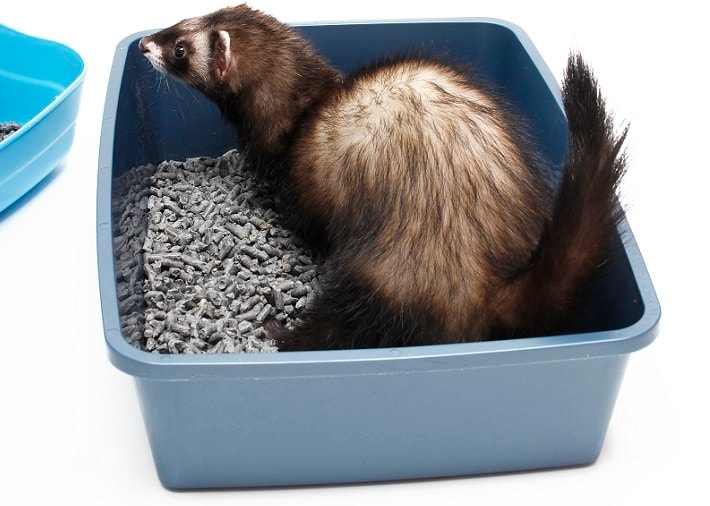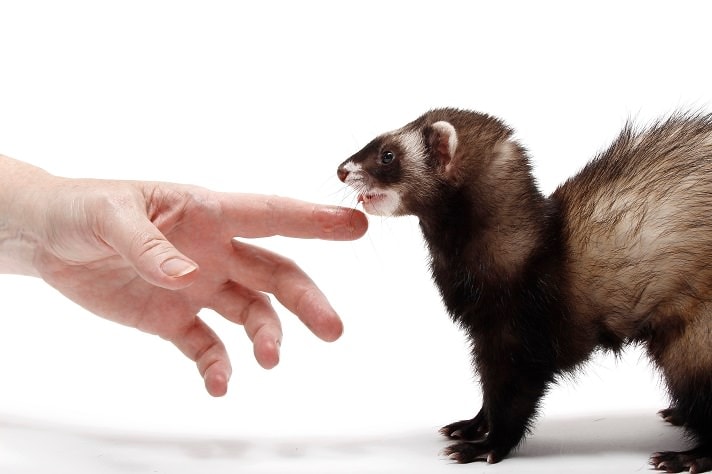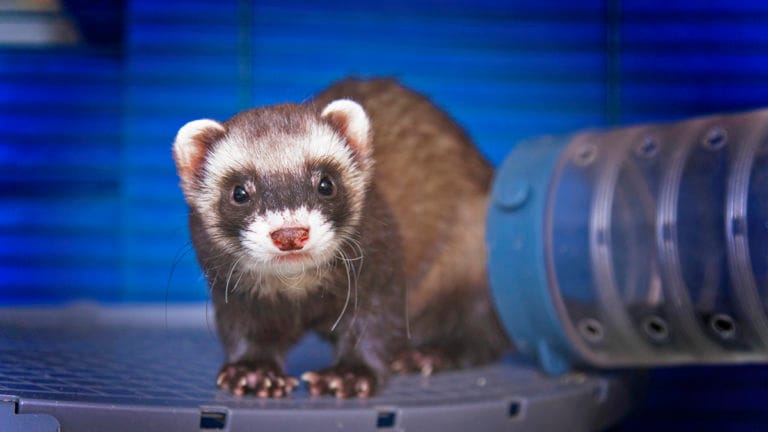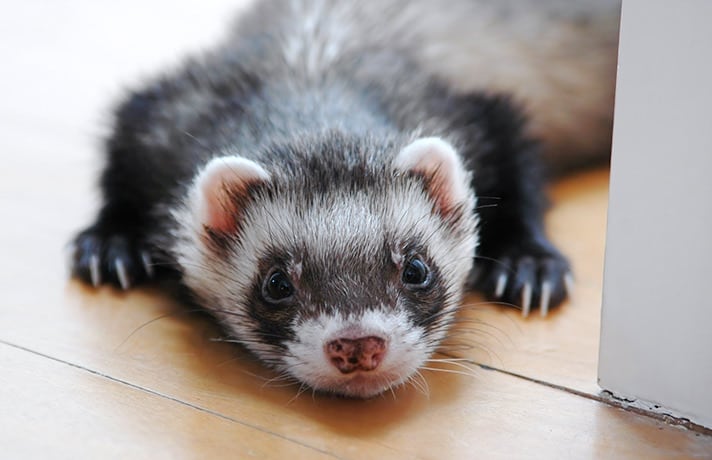Understanding what ferrets can and can’t eat is essential for keeping them healthy and thriving. With so many diet options—from dry food to whole prey—it can be tough to know what’s best and ensure their food provides a healthy balance. So, what do ferrets eat?
We spoke to two ferret experts, Cathy Johnson-Delaney, DVM, co-founder of the Washington Ferret Rescue and Shelter, and Robin Landes, education director for the American Ferret Association. They answer ferret diet questions, helping you choose the top-rated ferret foods and avoid common pitfalls.
In This Guide:
What Can Ferrets Eat?
With their sharp needle-like teeth, ferrets are obligate carnivores, meaning they get their nutrition from animal flesh and have trouble digesting plants.
A healthy ferret’s diet balances protein and fat. They don’t need any fruits and vegetables, so your ferret should also have minimal carbohydrates and fiber in their diet.
Many ferret parents feed their pets a commercially prepared kibble diet, sometimes called “dry food.” Others serve commercially prepared frozen foods, which can be defrosted and served raw.
Because their balance of protein and fats is carefully accounted for, commercially prepared foods are an easy way to provide a healthy diet for your ferret. However, some ferret parents take a DIY approach, feeding whole prey like mice or rats, or even a homemade raw diet for their pets.
It’s important to work with a veterinary nutritionist if you choose to feed a homemade diet, both to ensure you provide the proper nutrients to your ferret as well as minimize risks of bacteria from raw meat and eggs.
No matter how you feed your ferret, it’s critical to ensure you provide them with foods that meet their unique nutritional needs. Talk to your veterinarian about the best diet for your pet.
What Should My Pet Ferret Eat?
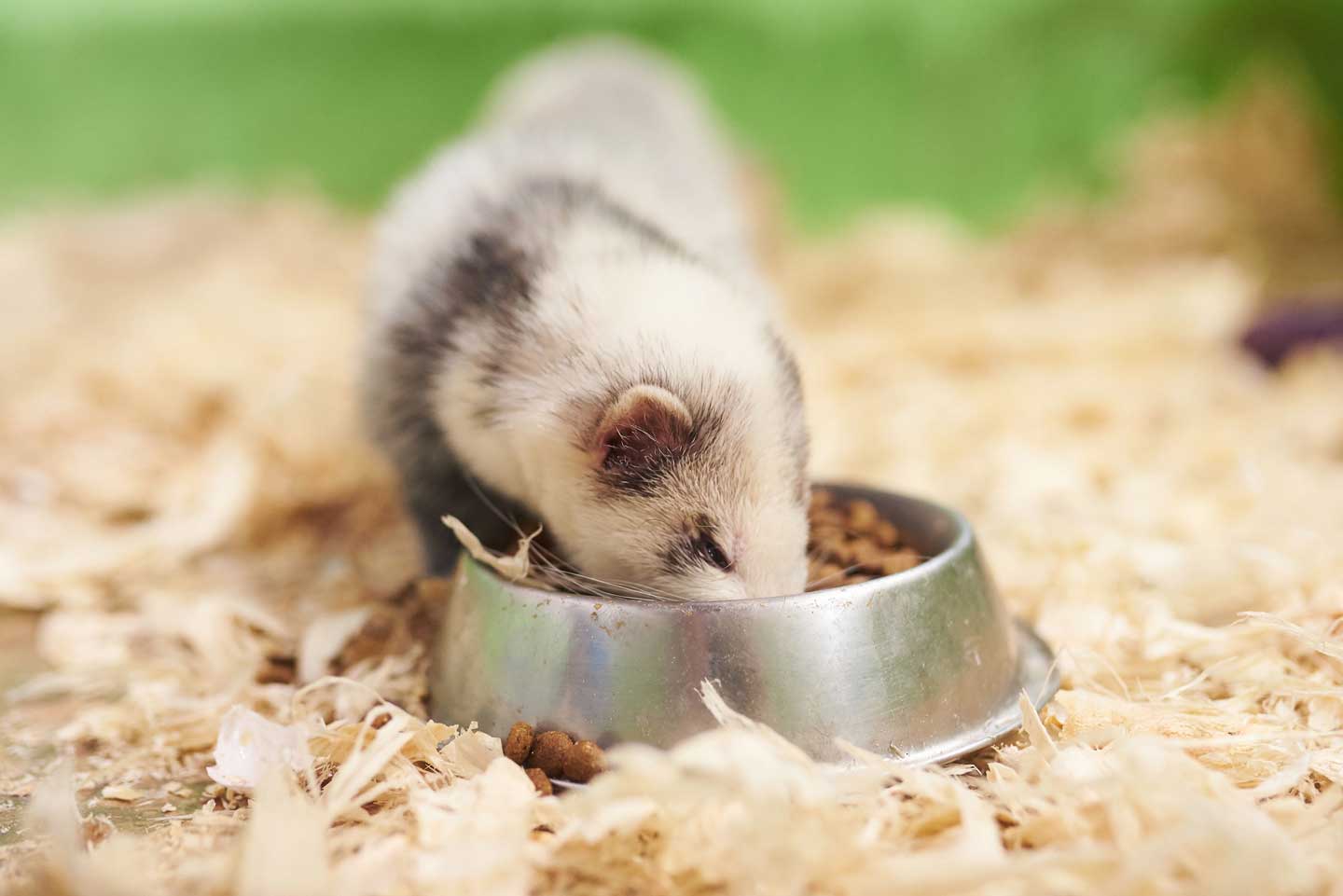
Ferrets need a careful blend of protein and fat. Unlike other animals, they get most of their calories from fat, not carbohydrates. Dr. Johnson-Delaney says a balanced ferret diet contains 35% to 45% protein and at least 30% fat. She adds that ferrets can’t digest anything with more than 4% fiber.
If you have questions about putting together a high-quality ferret diet, it’s essential to seek out a veterinarian who specializes in ferrets. You can find a list of experienced veterinarians on the American Ferret Association webpage. Pet parents should also seek a nearby ferret shelter or rescue to help with day-to-day questions or emergencies.
The Best Ferret Foods
Dr. Johnson-Delaney recommends ferret food brands developed by experts with a background in animal nutrition who have conducted extensive feeding trials on the product.
Rather than exclusively using one brand, she recommends purchasing three or four brands and blending the kibble to feed your ferret. This way, your ferret won’t suffer from digestive issues if there’s a recall, shortage, or formula change with your preferred brand.
Ferret food brands Dr. Johnson-Delaney recommends include:
Ferret Treats
Treats for ferrets should be given sparingly, says Dr. Johnson-Delaney. But if your ferret eats a kibble diet, the occasional special item can make for a delicious treat.
So, what can ferrets eat when it comes to treats? Our experts recommend:
- Freeze-dried meats like rabbit, chicken, and duck
- Whole eggs
- Meat-flavored baby foods
- Commercial ferret treats
While it’s not a treat, Dr. Johnson-Delaney also recommends keeping Critical Care Carnivore supplement on hand to assist in case of feeding emergencies with your ferret. The food can be given on a short-term basis to a sick ferret who is not eating enough.
What Foods Should Ferrets Avoid?
As an obligate carnivore, your ferret primarily needs meat to stay healthy, and there are lots of non-meat foods they will have trouble digesting:
- Sugar: Any food that contains sugar can lead to long-term health problems for ferrets, including pancreatic tumors. Chocolate is also toxic for ferrets, just like it is for dogs. It’s best to avoid anything humans consider sweet.
- Fruits: While fruits may seem healthy, they’re high in sugar and should be avoided. This includes raisins, which are toxic to ferrets too.
- Vegetables: Plant protein is not good for ferrets, and they need very little (if any) carbohydrates and fiber in their diet. Pet parents should also avoid commercially prepared foods made with ingredients like peas, legumes, lentils, or sweet potatoes, because these can lead to urinary problems for ferrets. Products marked grain-free may use vegetables, too, so watch out for that.
- Dairy: Your ferret is lactose-intolerant and can’t digest dairy products. This means no ice cream, milk, or cheese. Some ferrets love the taste of yogurt drops, but these are also a no-no because of the lactose and sugar.
- Bones: While your ferret can eat bones as part of whole prey, you should never give your pet a bone to chew on; it can splinter and cause digestive damage.
How To Feed a Ferret
According to Dr. Johnson-Delaney, food can pass through a ferret’s digestive system in only three hours. It’s normal for your ferret to poop six to eight times a day. That’s why your ferret needs to eat frequently and replace needed nutrients.
Ferrets should eat every four to six hours so they won’t run out of energy. Many pet parents free-feed their ferrets, leaving dry food in a bowl for them to feed on throughout the day.
Some pet parents who feed raw meat or whole prey may serve main meals with these items, and allow their ferret to free-feed on kibble the rest of the day.
FAQs About Ferret Food
Q:What do ferrets eat in the wild?
A:The breed of domestic ferrets in the United States has never lived outside the home, so they don’t have a “wild” diet. This type of domestic ferret is an obligate carnivore and needs a meat-based diet to stay healthy and thrive.
Q:What can I feed my ferret if I run out of food?
A:If you run out of dry food for your ferret, you could feed them chicken or eggs for a few meals. Dry kitten food can also be used as a short-term substitute while you stock up on more ferret food. However, kitten food is not suitable for a long-term ferret diet, so it’s important to return to your pet’s usual diet as soon as possible.
Q:Do ferrets eat mice?
A:Domestic ferrets can eat whole prey such as mice, rats, and rabbits. These items are sold frozen, then can be thawed and served to your ferret.
Q:Can ferrets eat cat food?
A:Cat foods are generally unsuitable for ferrets because they contain too many carbohydrates and fiber. They also don’t have the right balance of protein and fat for your ferret. While your ferret might seem OK with eating a cat food diet, it isn’t the best food for their long-term health and well-being.
Q:Can ferrets eat dog food?
A:No, ferrets should not eat dog food. Dogs’ kibble size is larger and harder to chew than ferret kibble. It’s also too high in fiber for ferrets, and has an inappropriate balance of protein and fat.
Share:








